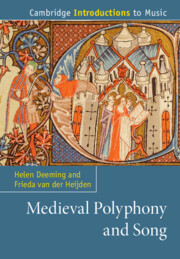Book contents
- Cambridge Introductions to Music
- Medieval Polyphony and Song
- Copyright page
- Dedication
- Contents
- Figures
- Tables
- Boxes
- Music Examples
- Acknowledgements
- Chapter 1 Introduction and Historical Outline
- Chapter 2 Monastic Centres in the Early Middle Ages
- Chapter 3 Court and Cloister in Aquitaine and Occitania
- Chapter 4 Paris: City, Cathedral, and University
- Chapter 5 Courts and Cities in Northern France
- Chapter 6 Scribes, Scholars, and Secretaries in Fourteenth-Century France
- Chapter 7 England after the Norman Conquest
- Chapter 8 On the Shores of the Mediterranean: Italy, Sicily, and the Iberian Peninsula
- Chapter 9 The German- and Dutch-Speaking Lands
- Chapter 10 Medievalisms: Modern Encounters with Medieval Polyphony and Song
- Glossary
- Bibliography
- Discography
- Index
- Cambridge Introductions to Music
- References
Chapter 9 - The German- and Dutch-Speaking Lands
Published online by Cambridge University Press: 27 April 2023
- Cambridge Introductions to Music
- Medieval Polyphony and Song
- Copyright page
- Dedication
- Contents
- Figures
- Tables
- Boxes
- Music Examples
- Acknowledgements
- Chapter 1 Introduction and Historical Outline
- Chapter 2 Monastic Centres in the Early Middle Ages
- Chapter 3 Court and Cloister in Aquitaine and Occitania
- Chapter 4 Paris: City, Cathedral, and University
- Chapter 5 Courts and Cities in Northern France
- Chapter 6 Scribes, Scholars, and Secretaries in Fourteenth-Century France
- Chapter 7 England after the Norman Conquest
- Chapter 8 On the Shores of the Mediterranean: Italy, Sicily, and the Iberian Peninsula
- Chapter 9 The German- and Dutch-Speaking Lands
- Chapter 10 Medievalisms: Modern Encounters with Medieval Polyphony and Song
- Glossary
- Bibliography
- Discography
- Index
- Cambridge Introductions to Music
- References
Summary
The large territory of Northern and Central Europe covered in the Middle Ages by the Holy Roman Empire is considered in Chapter 9. We consider the music of mystics and visionaries, including St Hildegard of Bingen and the Dutch-speaking Hadewijch. Religious reform movements in northern areas and in Bohemia, including Modern Devotion and Utraquism, had important consequences for liturgical singing, and we observe the survival in these areas of polyphonic traditions apparently dating back to the centuries considered in Chapter 2. In the courtly environment, the Minnesingers took up the traditions of the troubadours, cultivating a distinctive approach to song in Middle High German and Middle Dutch. This chapter concludes with a manuscript of song whose name is well known but whose contents are difficult to classify: the thirteenth-century Carmina Burana juxtaposes Latin and vernacular, notated and un-notated, and the religious and secular, to a remarkable degree.
Keywords
- Type
- Chapter
- Information
- Medieval Polyphony and Song , pp. 181 - 202Publisher: Cambridge University PressPrint publication year: 2023

